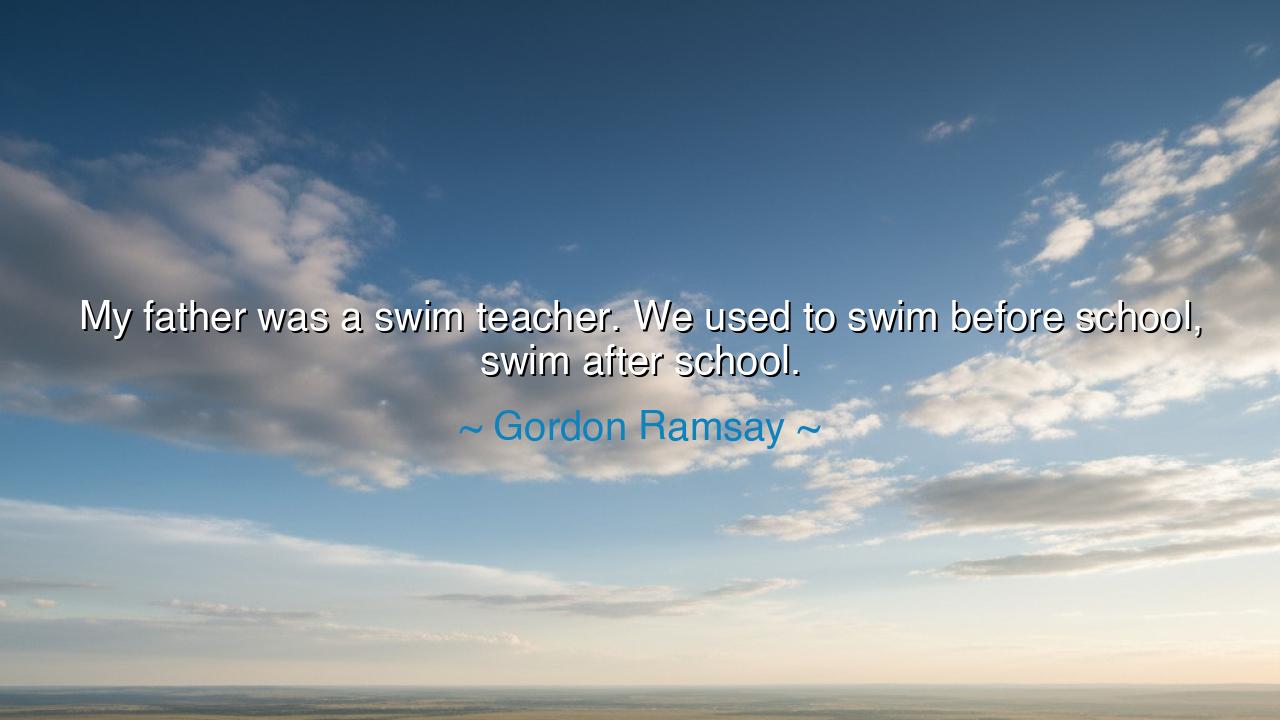
My father was a swim teacher. We used to swim before school






Hear the words of Gordon Ramsay, a man known for fire in the kitchen yet formed first in the waters of discipline: “My father was a swim teacher. We used to swim before school, swim after school.” In this simple recollection lies a truth greater than mere exercise or sport. It speaks of the shaping of character through the rhythm of labor, the forging of resilience through repetition, the passing of strength from father to son not only by word but by daily ritual. The pool became not just a place of water, but a crucible where endurance, determination, and focus were born.
The father stands here as teacher and guide, not only showing his child how to float or move but teaching through habit that greatness is not achieved in sudden bursts, but in the steady tide of practice. Morning and evening, before and after the distractions of the world, the boy was placed in the water. Through this discipline, he learned the ancient truth: mastery begins not with talent but with perseverance. As the river shapes the stone through countless passes, so too does daily training shape the soul into something strong and unyielding.
The act of swimming, repeated so faithfully, is more than motion. It is a metaphor for life itself. To swim is to struggle against resistance, to push the body through an element not its own, to learn the art of breath amidst challenge. One who swims learns calm amidst exertion, focus amidst struggle. Ramsay’s words remind us that this was his childhood’s song: rising early to embrace the challenge, ending the day by returning again to the waters, never fleeing from effort but learning to meet it as a companion.
Consider the story of Themistocles, leader of Athens, who prepared his people not for ease but for the storm of war. Knowing that strength at sea would save his city, he trained his fleet ceaselessly, day and night, until they could maneuver with unmatched skill. When Persia came with its vast armada, it was not luck but preparation, not talent but endurance, that gave Athens victory at Salamis. Just as the Athenians found salvation through discipline at sea, so too does Ramsay’s tale remind us: greatness is born in waters of persistence.
The meaning of Ramsay’s memory is therefore not about swimming alone, but about the eternal rhythm of discipline. To practice before the world calls you, and again after it has drained you, is to show devotion to the path of mastery. What a child first resists, he later treasures, for it builds within him the habits that carry him through trials in every field of life. From pool to kitchen, from athlete to chef, the foundation remains the same: repetition, resilience, and a relentless pursuit of excellence.
The lesson for us, O seekers, is this: do not despise the daily labor, the repeated task, the small ritual. Whether it is study before dawn, training of body, or cultivation of craft, these repetitions are not chains but wings. They carry you toward mastery, toward greatness, toward a life of purpose. Let the memory of Ramsay’s swimming be a parable — that those who endure the training of today shall be the masters of tomorrow.
Therefore, take these practical actions: establish for yourself a rhythm of discipline. Begin your day with a practice that strengthens your body, mind, or spirit, and end your day by returning once more to that practice, so that your life may be bookended by growth. If you guide others, whether children or students, give them not only knowledge but also the discipline of repetition, for this is the true inheritance. And when weariness tempts you to abandon the effort, remember the waters of Ramsay’s youth — and swim on.
So remember his words: “We used to swim before school, swim after school.” This is not merely the memory of a boyhood routine, but the testimony of how greatness is forged. Embrace your own waters, dive into them with courage, and rise from them each day stronger, more disciplined, more alive. For it is through such rhythms that the ordinary life is transformed into the extraordinary.






AAdministratorAdministrator
Welcome, honored guests. Please leave a comment, we will respond soon